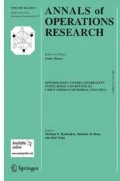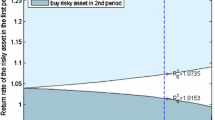Abstract
In this paper we consider a finite-state financial market with non-proportional transaction cost and bid-ask spreads. The transaction cost consists of two parts: a fixed cost and a proportional cost to the size of transaction. We show that the existence of an optimal consumption policy implies that the market has no strong arbitrage; the opposite, however, is not true, i.e., no strong arbitrage does not imply the existence of an optimal consumption policy. This is in sharp contrast with the case of proportional transaction cost and other cases reported in the literature, where no strong arbitrage is equivalent to the existence of an optimal consumption policy. We also study the relationship between weak arbitrage and strong arbitrage. Different from the market with proportional transaction cost, we find that these two forms of arbitrage are equivalent unless the fixed cost is zero. A necessary and sufficient condition for the existence of an optimal consumption policy is also obtained.
Similar content being viewed by others
References
Ardalan, K. (1999). “The No-Arbitrage Condition and Financial Markets with Transaction Costs and Heterogeneous Information: The Bid-Ask Spread.” Global Finance Journal 10, 83–91.
Borwein, J.M. (1977). “Proper Efficient Points for Maximization with Respect to Cones.” SIAM Journal on Control and Optimization 15, 57–63.
Carassus, L., H. Pham, and Z. Touzi. (2001). “No Arbitrage in Discrete Time under Portfolio Constraints.” Mathematical Finance 11(3), 315–329.
Carman, M.B. and J.A. Ohlson. (1981). “Valuation of Risk Assets in Arbitrage-Free Economics with Transactions Costs.” Journal of Financial Economics 9, 271–280.
Cox, J.C. and C.F. Huang. (1989). “Optimal Consumption and Portfolio Policies when Asset Prices Follow a Diffusion Process.” Journal of Economic Theory 49, 33–83.
Deng, X.T., Z.F. Li, and S.Y. Wang. (2000). “On Computation of Arbitrage for Markets with Friction.” In Computing and Combinatorics, Lecture Notes in Computer Science. Vol. 1858. Springer-Verlag, Berlin, pp. 310–319.
Dermody, J.C. and E.Z. Prisman. (1993). “No Arbitrage and Valuation in Market with Realistic Transaction Costs.” Journal of Financial and Quantitative Analysis 28(1), 65–80.
Detemple, J.B. and F. Zapatero. (1992). “Optimal Consumption-Portfolio Policies with Habit Formation.” Mathematical Finance 2(4), 251–274.
Duffie, D. (1996). Dynamic Asset Pricing Theory, 2nd edition. New Jersey: Princeton University Press.
Hakansson, N.H.(1970). “Optimal Investment and Consumption Strategies under Risk for a Class of Utility Functions.” Econometrica 38(5), 587–607.
He, H. and N.D. Pearson. (1991). “Consumption and Portfolio Policies with Incomplete Markets and Short-sale Constrains: The Finite Dimensional Case.” Journal of Economic Theory 54, 259–304.
Hubermann, G. (1982). “A Simple Approach to Arbitrage Pricing Theory.” Journal of Economic Theory 28, 183–191.
Jouini, E. and H. Kallal. (1995). “Martingales and Arbitrage in Securities Markets with Transaction Costs.” Journal of Economic Theory 66, 178–197.
Karatzas, I., J.P. Lehoczky, and S.E. Shreve. (1987). “Optimal Portfolio and Consumption Decisions for a “Small Investor” on a Finite Horizon.” SIAM Journal on Control and Optimization 25(6), 1557–1586.
Li, Z.F. and S.Y. Wang. (2001). Portfolio Optimization and Non-arbitrage(in Chinese). Beijing: Science Press.
Merton, R.C. (1971). “Optimum Consumption and Portfolio Rules in a Continuous Time Mode.” Journal of Economic Theory 3, 373–413.
Prisman, E.Z. (1986). “Valuation of Risky Assets in Arbitrage Free Economics with Frictions.” Journal of Finance 41, 545–560.
Rockafellar, R.T. (1970). Convex Analysis. New Jersey: Princeton University Press.
Ross, S.A. (1976). “The Arbitrage Theory of Capital Asset Pricing.” Journal of Economic Theory 13, 341–360.
Ross, S.A. (1978). “A Simple Approach to the Valuation of Risky Streams.” Journal of Business 51, 453–475.
Shirakawa, H. and H. Kassai. (1993). “Optimal Consumption and Arbitrage in Incomplete. Finite State Security Markets.” Journal of Operations Research Society 45, 349–372.
Shreve, S.E., H.M. Soner, and G.-L. Xu. (1991). “Optimal Investment and Consumption with Two Bounds and Transaction Costs.” Mathematical Finance 1(3), 53–84.
Wang, S.Y. and Y.S. Xia. (2002). “Portfolio Selection and Asset Pricing.” Lecture Notes in Economics and Mathematical Systems. Vol. 514, Berlin: Springer-Verlag.
Wilhelm, J. (1985). Arbitrage Theory. Berlin: Springer-Verlag.
Author information
Authors and Affiliations
Corresponding author
Additional information
Supported by CAS, NSFC, RGC of Hong Kong and NSF under Grant No. DMI-0196084 and DMI-0200306.
Rights and permissions
About this article
Cite this article
Chao, X., Lai, K.K., Wang, SY. et al. Optimal Consumption Portfolio and No-Arbitrage with Nonproportional Transaction Costs. Ann Oper Res 135, 211–221 (2005). https://doi.org/10.1007/s10479-005-6242-8
Issue Date:
DOI: https://doi.org/10.1007/s10479-005-6242-8




